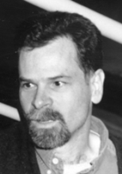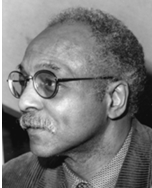|

Media Access and Media Power
Saturday, May 9, 1998
11:00-12:30 pm
Speakers: Doug Schuler and Nolan Bowie
Moderator: Tom Horan
[These are edited summaries, not complete transcripts.]
[The complete text of Doug Schuler's paper is also available.]
Doug Schuler: There is nothing inherently democratic about Internet technology. In fact, access to the net is highly exclusive and that doesn't appear to be changing. Internet use by those with incomes in the lowest twenty percent has increased only slightly, while usage among all other income levels has increased dramatically. If this trend continues, the Internet will serve to enlarge the chasm between the rich and the poor in our society.
Whose responsibility is it to promote democracy in America? Some people say it is not even business's "business." I see little evidence that the academy is encouraging access to the this new technology. I think that the government should promote democracy. But, again, government isn't necessarily going to do it. Citizens should recognize that they must work to protect their own interests in creating democratic access to new media, exploiting non-profit and other institutions.
As a computer scientists interested in democracy, I have gotten involved in "community networks," which try to develop public space in cyberspace. This is one model of using new media for democracy. The Seattle Community Network is one instance of a larger movement to develop community-oriented computer networks to support geographical community rather than virtual community.
| 
|
| |
At a very general level, a community network is a big electronic bulletin board system that provides "one-stop shopping" for information and communication about community-related meetings, projects, events, issues, and organizations. Such networks also offer new participatory opportunities for community dialogue. These networks are an "existence proof" that democracy in cyberspace is not an oxymoron, and they are important civic institutions that deserve support.
While the Internet as "platform for change" may be dominated by a handful of corporate interests, there are opportunities for communities to develop open, equitable, and useful communication systems Clearly , communication -- and therefore new technologies of communication -- are at the heart of any democratic revitalization. We therefore need projects that integrate democracy and communication technology. Disconnected projects are insufficient, because they are likely to remain marginal and unnoticed. A tapestry of democratic technology projects that are part of a broad social movement is required. If large numbers of people are involved in the movement, there may be a realistic hope for increased democratization.
|
Nolan Bowie: As a public interest communications lawyer and advocate, I believe the key terms
for this discussion are democracy, power and access.
- Democracy. This means government by "the people" for "the people." The people are in charge of their live s and can influence the course of their own fate. Citizens need to be able to gather information, identify like-minded people, and organize themselves. A democracy cannot function without communications free from control by government or any major group, including corporations.
- Power. Political power is the ability to influence political decisions and outcomes. The players who have the best information and the deepest pockets tend to win. Power is disproportionally held by corporate leaders who are only accountable to their bottom lines, boards and stockholders. The general public does not participate very often, and when they do, they tend to lose and become discouraged from participating in what turns out to be a charade, the mere appearance of dialogue or participation.
- Access. The first amendment guarantees the right to speak and publish freely, but "the people" only have rights to the press through ownership. Traditional media ownership is being rapidly concentrated, and what used to be considered illegal vertical concentration, is now considered mere synergy. However, the Internet was built by the government, and that may provide a solution to the access problem.
|  |
| |
Eighty-seven and a half million dollars worth of the public spectrum is about to be distributed to commercial broadcasters, and the Gore commission is considering whether or not broadcasters ought to have any public interest obligations. This is an opportunity to improve citizens' access to the media, thus increasing their political power and opportunities to participate in the democratic process.
We are in a crisis that the public doesn't know about, since most people aren't aware of what is happening as we shift to digital technologies. New digital communication technologies could serve to rejuvenate the democratic process or accentuate undemocratic tendencies in the political system.
|
Discussion Highlights
Jock Gill: A friend of mine tried to install solar-powered radios in African villages to allow the villagers to communicate. His plan failed, and on his the last day in Africa, he was told: "You know why it didn't work? The government didn't want it to work because of those radios would have allowed ordinary villagers to join together, so the military went around and smashed the radios." This suggests that Doug Schuler's group should collaborate with similar groups to form an alternative network for political action.
Instead of taking some of the spectrum and divvying it up, I would ask, "Why do we use fixed-spectrum assignments and why aren't we using a spread-spectrum allocation?" This would imply a spectrum-abundance rather than a spectrum-scarcity metaphor. We have the technology for doing this; there was a satellite and a wireless conference in Washington last week.
A second key aspect of emerging technology is cryptography. This has vast implications for democracy, e-commerce, and media-access. For example, Rupert Murdoch owns the encryption technology in every set-top box on television sets in England, which means that if you wish to broadcast something, you must go to Mr. Murdoch and get permission to use his encryption technology. And to get that, you must pay him. It also means that Mr. Murdoch can deny you access to the distribution system.
| |
| |
Douglas Schuler: Without scarcity, you don't have profit, so sometimes scarcity is being invented. For example, We're going to go to digital TV, because some people have decided that's what we're going to do. Now everybody has to have a new television set. That's the invention of scarcity where scarcity didn't exist before.
Nolan Bowie: In order to make that transition to digital television, each of the 365 television stations is going to have to spend millions of dollars. During the interim period, they'll also have to provide both an analog and a digital signal. All together, that is more than $2 billion that they don't have. Now Public Broadcasting has always been under-funded and that's why they do beg-a-thons. Where are they going to get what it is going to cost for the transition? Will they be able to survive without government subsidies?
|
|